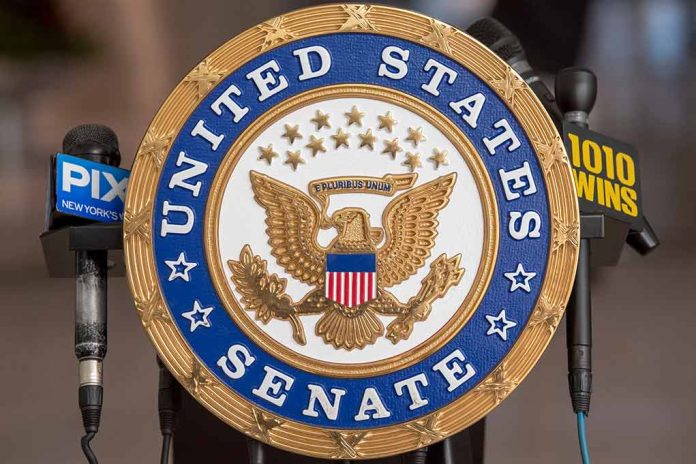
Senator Mark Warner’s criticism of the Democratic Party’s “woke” image at the Munich Security Conference highlights the party’s struggle to connect with a broader electorate.
Key Takeaways
- Sen. Mark Warner labeled the Democratic Party’s branding as “really bad” and suggested learning from President Trump’s messaging strategies.
- Warner acknowledged that criticism of the party’s “over-the-top wokeism” is a valid attack.
- Democrats lost control of the House, Senate, and presidency in the 2024 election, prompting calls for rebranding.
- The party faces internal debate on whether policies or messaging are to blame for electoral failures.
- Warner emphasized the need for Democrats to make cultural connections with voters across demographics.
Democratic Party’s Image Crisis
In a startling admission at the Munich Security Conference, Senator Mark Warner (D-VA) delivered a scathing critique of his own party’s public image. Warner’s comments have reignited discussions about the Democratic Party’s struggle to connect with a wide range of American voters, particularly in the wake of significant electoral losses in 2024 with the senator saying” the Democratic Party’s branding is “really bad,” and said that his party could learn a thing or two from President Donald Trump when it comes to messaging.”
According to the Democratic senator, the party is culturally disconnected with Americans. DETAILS: https://t.co/dey1hoBQ5Z pic.twitter.com/ORnPk5M3T0
— VOZ (@Voz_US) February 16, 2025
This stark assessment from a prominent Democratic figure underscores the growing concern within the party about its ability to resonate with voters beyond its traditional base. Warner’s criticism extends beyond mere messaging, touching on deeper issues of cultural disconnect and the party’s perceived ideological rigidity.
The “Woke” Dilemma
At the heart of Warner’s critique is the concept of “wokeism,” a term that has become increasingly contentious in American political discourse. Originally intended to denote awareness of social justice issues, “woke” has been weaponized by Republicans to criticize what they perceive as the Democrats’ excessive focus on identity politics and social progressivism.
“I think the Democrats brand is really bad, and I think this one election was based on culture, and the Democrats’s failure to connect on a cultural basis with a wide swath of Americans is hugely problematic.” Warner’s acknowledgment that criticism of the party’s “over-the-top wokeism” is valid suggests a growing realization within Democratic ranks that their messaging may be alienating potential supporters, particularly among working-class voters across various demographics.
Electoral Consequences and Internal Debate
The Democrats’ failure to maintain control of the House, Senate, and presidency in the 2024 election has prompted serious soul-searching within the party. This electoral setback has intensified the internal debate over whether the party’s policies or its messaging are primarily to blame for its recent failures at the ballot box.
Former Representative Tim Ryan has gone so far as to describe the Democratic brand as “toxic,” calling for a complete overhaul of the party’s image. Similarly, Senator Bernie Sanders has criticized the party for abandoning working-class people, leading to a significant loss of support in key demographics.
Learning from the Opposition
Warner suggested that Democrats could learn valuable lessons from President Donald Trump’s communication strategies. He noted Trump’s effective use of modern platforms like podcasts and his ability to maintain a supportive network to communicate with followers, even in the face of controversial statements.
This observation highlights the changing landscape of political communication and the need for Democrats to adapt to new media realities. Warner’s comments suggest that simply focusing on voter turnout may not be sufficient; instead, the party must find innovative ways to engage with the electorate and build a more robust support network.
A Path Forward
As the Democratic National Committee elects new leadership, including Ken Martin as the new chair, there are signs that the party is taking steps to address these concerns. Martin has emphasized the Democratic Party’s focus on working people and the need to compete in every election, signaling a potential shift in strategy.
The challenge for Democrats moving forward will be to strike a balance between maintaining their core values and broadening their appeal to a wider range of Americans. This may require a reevaluation of both policy priorities and messaging strategies to ensure that the party can effectively communicate its vision for the country without alienating potential supporters.
As the 2026 midterms election looms on the horizon, the Democratic Party’s ability to heed Warner’s warnings and adapt its approach may well determine its future electoral success. The coming months and years will reveal whether the party can successfully rebrand itself as a champion of working-class Americans while still addressing the social justice concerns that have long been central to its identity.
Sources:
Dem Sen. Warner Admits ‘Over-Wokeism’ Is ‘Valid Attack’
Mark Warner says Democrats’ brand is ‘really bad’
Democrat Senator Admits Criticism of ‘Over-Wokeism’ Is ‘Valid Attack’







